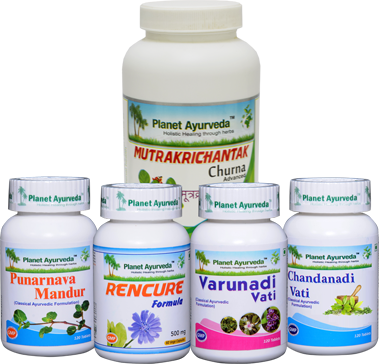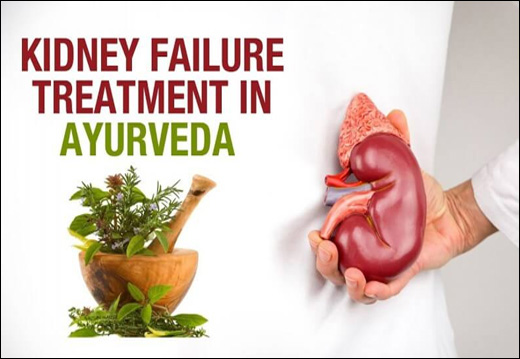Whenever we hear about kidney failure, the first thing that comes to mind is dialysis and kidney transplant. The modern system of medicine always recommend dialysis for people with kidney failure. But there is also an alternative treatment of kidney failure without dialysis i.e. Ayurvedic treatment. Nature provides many herbs which provide amazing treatment for kidney disease. The overall prevalence rate of chronic kidney disease patients in the global population is about 14% (6).
INTRODUCTION
Kidney failure is the last stage of chronic kidney disease (5) that's why known as an End-Stage Renal Disease (ESRD). At this stage, kidneys are unable to work properly and to eliminate toxins from the blood.

SYMPTOMS OF KIDNEY FAILURE
A few or no symptoms appears in the patients of Kidney failure until the situation becomes more severe. It is difficult to identify the symptoms on early-stage as they do not show serious effects.
Some Early Signs Of Kidney Disease Are
- Reduction in urine output
- Fluid retention
- Dyspnea
When Kidneys Start Functioning Improperly
- Kidneys fail to remove water waste
- Reduced urination
- Swelling in legs, feet and ankles
- Breathlessness and Chest pain
- Lack of appetite
- Persistent nausea and vomiting
- Sleeplessness
- Pain in abdomen
- Backache
- Nosebleeds
- Rash and itching
- Diarrhea
- Confusion and seizures
- Fatigue
- Coma
CAUSES OF KIDNEY FAILURE
Kidney failure may be caused due to the presence of any other disease and physical damage to kidneys. When the kidney damage continues for a long time, it becomes worse and makes the kidneys unable to work properly. It is the leading cause of chronic kidney disease. The two most common diseases which are leading cause of kidney failure are:
- Diabetes (high blood sugar level)
- Hypertension (high blood pressure)
Other Diseases Which May Cause Kidney Failure
- Nephrotic Dyndrome
- Autoimmune diseases
- Genetic diseases
- Urinary Tract Infection
AYURVEDIC ASPECT FOR KIDNEY FAILURE OR CHRONIC KIDNEY DISEASE (CKD)
According to Ayurveda, all kidney disorders come under MutravahaSrotas. Srotas are the functional pathway in the body, so blockage of mutravahasrotas causes kidney failure. All the three dosha in the body (Vata, Pitta, and Kapha) and Dushyas are also involved in the generation of the disease. Kapha causes the blockage of microvessels resulting in inmicroangiopathy. Vata causes the degeneration of the kidney cells.
TREATMENT OF KIDNEY FAILURE WITHOUT DIALYSIS
Ayurveda offers the herbal remedies for the treatment of kidney failure and avoid dialysis in the kidney patients. There are many herbs which are wonderful to revive kidney failure, reduce swelling and volume of accumulated fluid, therefore increasing the chances of revival of kidneys without dialysis. In modern system there is no proper treatment for kidney failure. They only recommend dialysis and kidney transplant.
SOME HERBS FOR THE TREATMENT OF KIDNEY DISEASES ARE
- Punarnava
- Varuna
- Gokshur
- Shigru
- Apamarg
1. Punarnava (Boerhavia diffusa)
Punarnava is a very useful herb that acts as a diuretic. The herb helps in eliminating excess water from the body which gets accumulated due to kidney failure (1). It is considered as the best herb for kidney failure.
2. Varuna (Crataeva nurvala)
This is another wonderful herb for kidney failure (2). It is effective in the treatment of kidney stones and urinary tract infections. Varuna helps in reducing swelling and flushes out excess fluid which gets accumulated due to kidney failure.
3. Amalaki (Emblica officinalis)
It contains powerful nutrients, rich in vitamin C that help to improve kidney health (3). It is useful in removing kidney stones, reducing high creatinine levels and high blood pressure. This herb is effective in the treatment of age-related renal disease.
4. Gokshur (Tribulus terrestris)
This herb acts as a diuretic and herbal medicine for the urinary system. It cleans the obstructive urinary tract and prevents infections. Gokshur strengthens the kidney cells and helps to regenerate them (4).
These herbs, individually, are also very beneficial for the kidney disease. But their action become more effective when they gets in the combination.
AYURVEDIC TREATMENT BY PLANET AYURVEDA FOR KIDNEY FAILURE WITHOUT DIALYSIS
Planet Ayurveda provides the best Ayurvedic products including these herbs which treat kidney failure without doing dialysis and kidney transplant in the form of Revive Kidneys Pack for kidney failure. These products are 100% pure, herbal, safe and contains no chemicals, preservatives and also do not cause any side effect.
The products included in Revive Kidneys Pack are the following:
- Mutrakrichantak Churna
- Varunadi Vati
- Rencure Formula
- Punarnava Mandur
- Chandanadi Vati
Revive Kidneys Pack

PRODUCTS DESCRIPTION
1. Mutrakrichantak Churna
Mutrakrichantak Churna is formulated with the wonderful herbs that are effective and safe for treating kidney failure and other kidney diseases. The herbs included in this churna are Punarnava (Boerhavia diffusa), Varuna (Crateva nurvala), Shirish (Albizia lebbeck) Gokshur (Tribulus terrestris), and Shigru (Moringa oleifera) etc. These herbs individually also shows effective results on kidney as:-
- Varuna and Apamarg are useful herbs for treatment of prostate enlargement. Gokshur shows rejuvenating action on the prostate and kidneys.
- Shirish is wonderful anti-allergic herb.
- Punarnava have strong diuretic property.
These herbs act synergistically together. These are useful in the treatment of kidney stones, high uric acid, creatinine level, and Urinary Tract Infection. Thus, Mutrakrichantak Churna is a best herbal formulation for the treatment of kidney failure without dialysis. It is also effective for those patients who are on dialysis.
Dosage: 1 Teaspoonful twice daily warm with water and for best result Boil 1 Teaspoonful in 400ml water until it remains 50-60ml. Filter the preparation with a regular tea strainer and drink. You should use this once in morning 45min. after breakfast and similarly in evening 45min. after dinner. Prepare fresh every time as per this.
2. Varunadi Vati
These tablets consist of a combination of best quality herbs like Varuna (Crataeva nurvala), Gokshur (Tribulus terrestris), Punarnava (Boerhavia diffusa), and Shuddha guggul (Commiphora mukul). These herbs have effective result on kidneys. These herbs possesses anti-inflammatory, diuretic, and analgesic properties. Thus due to presence of these effective herbs, Varunadi Vati is useful in the treatment of various kidney diseases and helps to avoid dialysis in patients with kidney disease.
Dosage: 2 Tablets, thrice daily with warm water after meals.
3. Rencure Formula
These herbal capsules are prepared from pure herbs that are effective in kidney failure like Varuna (Crataeva nurvala), Gokshur (Tribulus terrestris), Punarnava (Boerhavia diffusa), Palaash (Butea monosperma) and Kaasni (Cichorium intybus). Rencure formula have effective results in the treatment of kidneys disease. It helps to rejuvenates the cells and revive organs of the body. The capsules are natural detoxiofier which help the kidneys to remove the toxins from the body without causing any side effects.
Dosage: 2 Capsules, twice daily with warm water after meals.
4. Punarnava Mandur
Punarnava is a very useful herb for kidneys, as it acts as a diuretic. Punarnava Mandur formulation consists of Punarnava (Boerhaavia diffusa) and many other effective herbs such as Pippali (Piper longum), Shunthi (Zingiber officinale), Maricha (Piper nigrum), Haritaki (Terminalia chebula), Amalaki (Emblica officinalis), and Mandoor Bhasma (Ferric oxide calx) etc which improves the kidney functions and hemoglobin level, increases blood circulation, and reduces inflammatory condition. Punarnava mandoor is very effective to manage the kidneys diseases and symptoms related to kidney disease.
Dosage: 2 Tablets, thrice daily with warm water after meals.
5. Chandanadi Vati
This classical remedy is very beneficial in providing relief from kidney disorders. It provides a calming and soothing effect on the urinary tract system and also provides relief from burning gut. It has anti-inflammatory and anti-oxidant properties. It is used in the treatment of burning micturition, kidney disorders, heatstroke, burning gut, piles, fissures, etc. This is a classical Ayurvedic formulation. It contains herbs and minerals like Safed chandan (Santalum album), Kababchini (Piper cubeba), Safed ral (Shorea robusta), Gandhabiroja (Pinus longifolia), Katha (Sanegellia catechu), Amalaki (Emblica officinalis), Daruharidra (Berberis aristata), Gairik (Red ochre), etc.
Dosage: 2 Tablets, twice daily with warm water after meals.
CONCLUSION
Hence, it concludes that, natural treatment is the best treatment for kidney failure and also avoid dialysis in the kidney patient. Planet Ayurveda provides the best Ayurvedic products for this. These products maintain the overall health of kidney and patient undergoing dialysis can also use these medicines.
REFERENCES
- http://medical.cloud-journals.com/index.php/IJAAYUSH/article/view/Med-171
- https://www.ncbi.nlm.nih.gov/pmc/articles/PMC3361922/
- https://www.ncbi.nlm.nih.gov/pubmed/17715896
- https://www.researchgate.net/publication/315108763_POLYHERABAL_TREATMENT_FOR_CHRONIC_KIDNEY_DISEASE_-_A_CASE_STUDY
- https://www.medicalschemes.com/medical_schemes_pmb/chronic_disease_list.htm
- https://www.niddk.nih.gov/health-information/health-statistics/kidney-disease
FAQs
Q1. What are the negative effects of dialysis?
Ans. The Patient of Kidney failure who goes under dialysis can suffer from low blood pressure which is a common negative effect of dialysis. Other effects can be nausea and vomiting, Dry or Itchy Skin, Restless Leg Syndrome, and muscle cramps, etc.
Q2. How long can I live with chronic kidney disease?
Ans. The most frequent question comes to the mind of the kidney patient. It depends on your age, the severity of illness and other health problems. It also depends on the healthcare you are following. CKD patients with kidney failure survive with dialysis or kidney transplantation.
Q3. What stage of kidney failure does dialysis require?
Ans. Dialysis is not required in the early stages of chronic kidney disease. But when it reaches Stage 4 when the eGFR falls between 15 and 29 or less than 30 mL / min, the kidney patient needs dialysis.
Q4. Is there any treatment for kidney failure in Ayurveda?
Ans. Yes, there is. Natural Ayurveda is best for treating kidney problems. Ayurveda provides the best herbs for the treatment of kidney failure patients without dialysis. The effect of Ayurvedic herbs on the kidney is reliable and variable.
Q5. What herbs help cleanse the kidneys?
Ans. Some herbs which help in cleansing of kidneys arekasini, punarnava, gokshru, varuna, amla, etc. These herbs individually and together shows synergistic effects on kidney.
Q6. Can damaged kidneys regenerate naturally?
Ans. Yes you can. For this, you should stay hydrated, eat healthy food (vitamins and minerals), keep an eye on your blood pressure, avoid smoking and alcohol, keep yourself slim, do not overeat, it helps you improve kidney functions naturally.
Q7. Who is at greater risk of kidney disease?
Ans. People 60 or older and those with diabetes and high blood pressure are at greater risk of kidney disease.
Q8. What causes end-stage renal disease (ESRD)?
Ans. Many kidney diseases attack the nephron which leads to impaired blood filtering and the presence of chronic hypertension, diabetes, and recurrent kidney stones are the major causes of ESRD.
Q9. Can Ayurvedic medicines be given to patients undergoing dialysis?
Ans. Yes, Ayurvedic medicines like Mutrakrichantak Churna, Punarnava Mandur are the medicines which are good for the patients undergoing dialysis.
Q10. What is the best alternative herb to Dytor/Lasix?
Ans. Punarnava is the best alternative herb to Dytor/Lasix. Other alternative herbs are Gokshura, Varuna, etc.
Q11. What kind of beverages are safe for Kidney patient?
Ans. Kidney patients may take fresh vegetable and fruit juice, which they are allowed such as bottle gourd, pumpkin, carrot, radish, apple, papaya and pear.Kidney patients may take coconut water in small amounts, they should also avoid processed drinks such as soda drinks, coke, limca and wine also.
Q12. How much water a kidney patients can take?
Ans. Kidney patients need to stay hydrated and drinking water is best for this but not more than 1 liter of water at any cost.
Q13. Why kidney patient has more vomits and body itching?
Ans. The kidneys release waste from the bloodstream. When the kidneys are unable to remove, waste accumulates in your blood which can cause severe itching and vomiting.
Q14. Why kidney patient should avoid constipation?
Ans. Constipation is one of the risk factors for kidney disease. Kidney patients should avoid constipation. In kidney disease, kidneys are unable to remove waste from the body and if that patient is constipated, it also prevents the removal of waste (feces). It increases the severity of kidney disease by increasing the buildup of wastes in the body.
Q15. Why gym diet is harmful for Kidney patient?
Ans. The gym diet consists primarily of high protein diets and protein supplements that impair kidney function and make it difficult for our body to eliminate waste products of protein metabolism. So, Kidney patients should avoid gym diet.
Q16. Why overdose of protein is harmful for kidneys?
Ans. The kidneys need to work harder to remove the metabolites of proteins from the body, which increases the pressure on the kidneys. So, overdose of protein can lead to the kidney damage.









